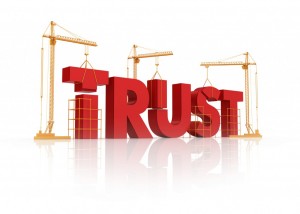 I ran across a quote the other day that resonated with me:
I ran across a quote the other day that resonated with me:
The organization of today will require leadership that can operate on the edge of chaos by relinquishing command and control and creating an environment of mutual trust and respect.
Two things struck me about this quote. One, just how much today’s leadership model differs from traditional leadership models. And two, how difficult it is for many leaders to do.
Look at all the challenges today’s leaders face: more information to analyze; four generations of workers to engage and lead; highly volatile markets due to the increasingly rapid rate of change; new technologies that make it cheaper and easier to knock off successful products; increased competitive threats, many of which can’t be foreseen or predicted… The list goes on and on.
Most leaders understand logically that the old “command and control” leadership paradigm fits the new business environment about as well as a manual typewriter. Yet, it seems that most are uncertain about how to create a culture that supports mutual trust and respect and many struggle with the day to day behaviors that are required for success.
Many of us don’t know how to act with transparency and clarity on winning. We don’t know how to provide candid and respectful feedback. And since most of us were taught early on that information is power, we tend to withhold it rather than sharing it openly and easily with others in the organization. Not a good formula for operating on the edge of chaos!
How can we raise trust levels among the people who work with us? Often, it starts with the “small” things.
Behavioral scientists tell us that trust accrues according to a specific hierarchy. Picture a series of concentric circles, like an archery target. At the center is our own experience, which we trust over anything else. The next circle outward consists of what friends and family tell us. The next circle includes reliable experts and journalists (although this one is changing rapidly). Farthest away are corporations, politicians, and other entities that we generally believe put their own best interests ahead of ours.
Based on this model, leaders and managers should fall into the “reliable experts” category. However, don’t assume that your position automatically makes you an expert in the eyes of employees. In terms of building trust, the way you treat people has just as much impact as your knowledge and expertise. You may be a whiz in your specific area, but treat people poorly and their trust in you will plunge.
One of the “small” things you can do to respect people is become a better listener, which is not as easy as it sounds.
Listening is an art, a skill, and a discipline. Like all skills, it needs self-control to be effective. Becoming a better listener requires understanding what is involved in listening and developing the necessary techniques to be silent and listen. In particular, it involves ignoring your own needs and focusing your attention on the person speaking, a task made much more difficult by the way our brain works.
When someone starts talking to us, our minds instantly get activated as we begin processing the words and meanings. So now, instead of hearing one “noise,” we’re hearing two – the “noise” the other person is making and the “noise” in our own heads. Unless we remain vigilant, we usually end up paying attention to the “noise” in our own heads.
You can’t stop this process and you don’t want to. Just remember that hearing becomes listening only when you pay attention to what is said and follow it very closely. So always be aware of which of the two noises you’re listening to.
Another way to improve your listening skills is to conduct a quick mental audit after important conversations. Ask yourself:
- Did I still the chatter in my head?
- Did I let the other person speak without interruption?
- Did I try to see things from the other person’s point of view?
- Did I convey interest in what the person was saying?
- Did I “listen between the lines”to notice connotations and implicit meanings?
- Did I resist the temptation to jump in with evaluative or disparaging comments?
- Did I rephrase what the other person said so as to better understand it?
- When I responded, did I speak clearly?
- Was I honest? Did I show empathy?
- Did I treat the other person with respect?
A few other small things: do what you say you are going to do; thank others who deserve it; expose your thinking process (how did you get to your conclusions?). Pause and fill in the blanks when others may not know what led you to a decision.
Operating on the edge of chaos goes a lot smoother when people respect and trust you. Make a commitment to better understand and build trust. Practice some of the small stuff. Become a better listener. Your trust levels will definitely rise.






